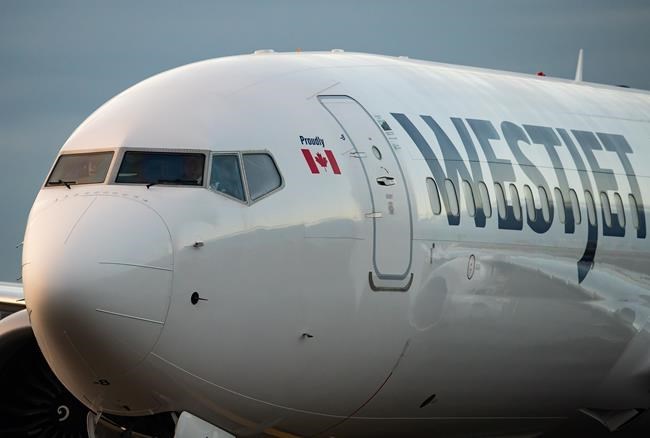MONTREAL — Canada's two biggest airlines have cut thousands more flights as COVID-19 continues to surge, miring the sector in uncertainty nearly two years after the pandemic began.
WestJet Airlines Inc. said Tuesday it will cancel 20 per cent of its February flights, less than three weeks after announcing flight reductions of 15 per cent for January.
The move marks a response to "government barriers" amid the Omicron variant, which has also affected staffing levels, the Calgary-based airline said.
"We continue to advocate for the elimination of cumbersome travel rules that are unnecessarily impacting Canadians and prolonging the recovery of the travel and tourism sector,” chief executive Harry Taylor said in a release.
While Air Canada has not announced major flight consolidations, it cancelled 15 per cent of its flights in March and 11 per cent in February — 6,805 flights in total — within the last two weeks alone, according to figures from airline data company Cirium.
"We continue to monitor and adjust our schedule in response to government regulations and other factors, as we have done since the pandemic began. However we have no update on schedule changes that we previously enacted," Air Canada spokesman Peter Fitzpatrick said in an email.
The Montreal-based company said in an advisory earlier this month it was suspending flights to at least 14 Caribbean destinations "in light of the current pandemic context," effective Jan. 24 through April 30.
The Public Health Agency of Canada advised against non-essential trips abroad in mid-December. A requirement that international travellers quarantine until on-arrival molecular tests come back negative has further dissuaded visitors, the two carriers said in a statement along with Toronto's Pearson airport Monday.
WestJet says it will notify affected travellers in the next few days. For any WestJet-initiated cancellation or schedule change, where the change is greater than 90 minutes or one or more stops are added, guests are eligible for a refund.
The cuts come after Transat A.T. cancelled nearly 30 per cent of its flights for January and February.
There were 1,946 cancellations for flights within, into or out of the United States on Monday and Tuesday, according to data from flight-tracking website FlightAware, though the timeframe overlapped with a snowstorm in the northeast.
Both Delta Air Lines and United Airlines have said the nationwide spike in cases over the past few weeks has affected flight crews and left carriers short-staffed.
Staffing issues are also plaguing at least one airport north of the border, though a labour dispute rather than an infectious disease is the direct cause.
St. John's International Airport will "not have adequate fire hall staffing levels to continue normal operations" as of Tuesday at 8 p.m., airport authority spokeswoman Lisa Bragg said in a release.
Flights at the airport — between 80 and 100 planes took off or landed there on most days in January 2020, according to FlightAware — will now be limited to cargo, medical evacuation and planes with fewer than 20 seats "until staffing levels change," she said.
The Union of Canadian Transportation Employees claims that a "campaign of harassment and discrimination" against firefighters has stifled their concerns around safety and regulatory compliance and ultimately thinned their ranks.
"The situation at the airport has been deteriorating for years and it is making air travel less safe and airport firefighters sick,” union regional vice-president Chris Bussey said in a release Monday.
"Management’s decision to make cost-cutting a priority over the safety of the travelling public has resulted in them being unable to provide any type of emergency response and has had a direct impact on operations."
Labour Minister Seamus O'Regan, whose represents a St. John's riding, said the situation is "unsustainable" and that senior officials from his department are now "involved."
"Immediate goal: minimize disruption and get the airport completely and safely up and running. Long-term goal: resolution of this dispute," O'Regan said in a Twitter post Tuesday afternoon.
Jacques Roy, a professor of transport management at HEC Montreal business school, said the Canadian government's guidance against travel abroad as well as general "uncertainty" around the pandemic are suppressing demand.
"Reservations are being cancelled," he said in a phone interview. "People who want to fly may be concerned about not being able to come back or facing all kinds of difficulties abroad."
Canadian air travellers who wish to return home must present a negative molecular test taken no more than 72 hours before the scheduled departure in order to board.
This report by The Canadian Press was first published Jan. 18, 2022.
Companies in this story: (TSX:AC, TSX:TRZ)
Christopher Reynolds, The Canadian Press


